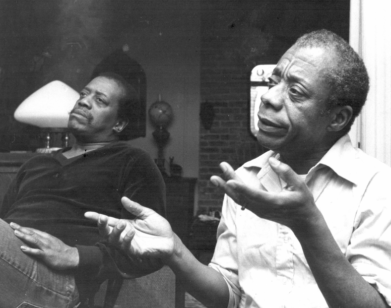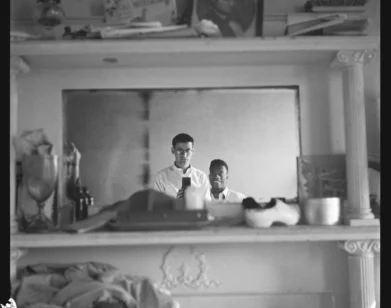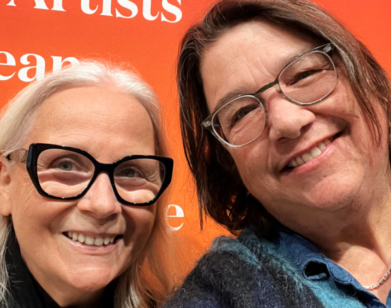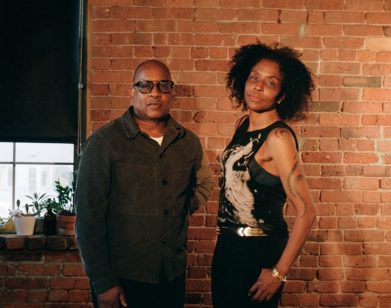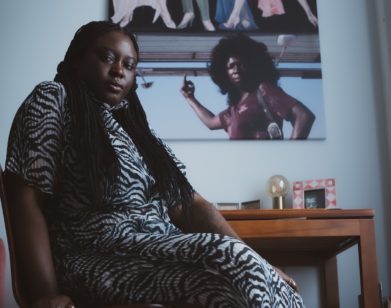Rough Draft
Jamal Jordan Wants to Have Dinner with Maya Angelou and James Baldwin
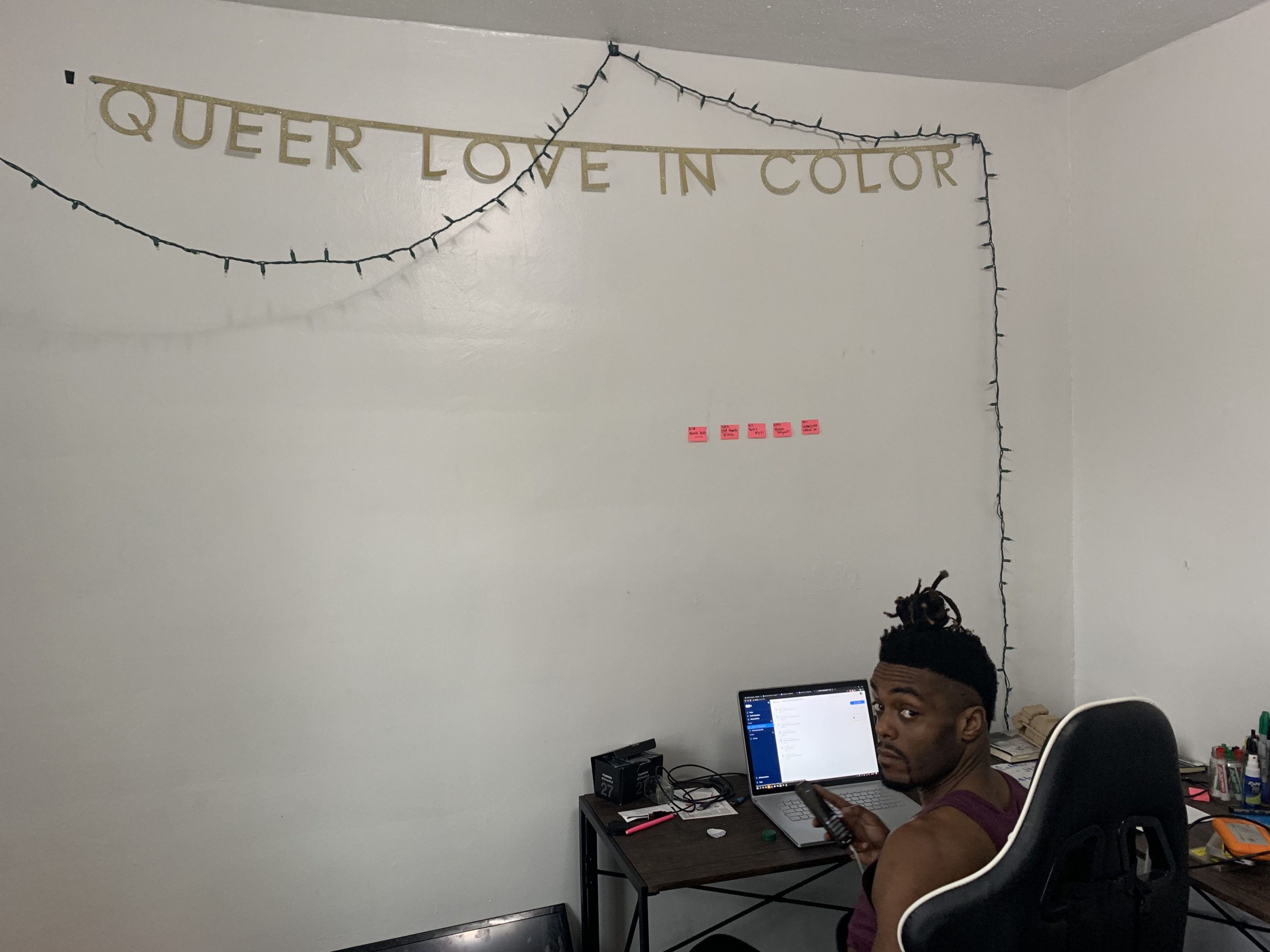
Jamal Jordan at his desk.
This is Rough Draft, in which our favorite writers get to the bottom of their own craft. From preferred writing drinks to whether or not you really need to carry a notebook, we find out all the ways they beat writer’s block and do the work. Before curling up with Queer Love in Color by Jamal Jordan, discover all the elements that helped him get it done.
———
JULIANA UKIOMOGBE: Describe your ideal writing atmosphere.
JAMAL JORDAN: I’m a really messy person, but when I actually need to get work done, there’s nothing better than cleaning up my space. So my first rule: cleanliness. I’m lucky enough to have a home office. When I started working on Queer Love in Color, I made a hard rule against ever working in bed, so I set up a room with great natural light, a gamer chair, and a hanging desk. It’s been perfect. I wish I was the kind of person who could set up his computer under some shade on a beach, but working in beautiful spaces is too distracting for me.
UKIOMOGBE: Do you eat or drink while you write? If so, what do you like to have?
JORDAN: I don’t eat while I write. I actually set writing goals and starve myself until I reach them.
UKIOMOGBE: Do you ever smoke or drink while you write?
JORDAN: I don’t drink before I write. Drinking makes me sloppy and my ADHD-addled brain needs all the focus it can get when putting words to a page. I’m a huge pothead, so I’m liable to have a joint before a writing session, but when I’m in the zone, liquor, weed, and food don’t get to enter my body until I’m done.
UKIOMOGBE: Do you keep a notebook and/or journal?
JORDAN: I kept a journal pre-COVID. I had a two-hour round trip commute to work and I used to find it really comforting to journal a lot. I did a lot of creative writing/fiction work/screenplays in my early 20s for fun—I’d always first-draft those by hand. Non-fiction work is a bit more meticulous for me, and my handwriting is absolute shit, so my journalism work is usually bound to a Google Doc.
UKIOMOGBE: What’s your favorite quote?
JORDAN: When I was working on my book, there was a quote—I forget the source—that stuck with me. I put it on a Post-It note above my desk: “This is supposed to be hard. It’s supposed to be the hardest thing you’ve ever done.”
UKIOMOGBE: What books did you read as a kid? Have your thoughts about the writers changed?
JORDAN: I read a lot of gay YA fiction as a teen. Most of it was unremarkable, and I’m struggling to remember any of the titles. I even read the novelizations of the Queer as Folk series (lol). This was, oddly, a really great lesson in writing—all the stories were formulaic, but it was a good way to learn basic story structure.
UKIOMOGBE: Do you read while you’re in the process of writing? Which writers inform your current work the most?
JORDAN: I love to read beautiful prose when I’m writing because it gives me something to aspire to. Lately, I’ve been re-reading passages from Yrsa Daly Ward’s The Terrible and challenging myself to write prose as moving as hers.
UKIOMOGBE: How many drafts of one piece do you typically write?
JORDAN: Most pieces of writing go through the following forms: 1. A very detailed outline, 2. A very rough attempt at writing through the beginning to the end of the story—“the first draft.” 3. I’ll print this out and then retype it into a new document, improving all the awkward prose/story holes. 4. I’ll re-read and do a final copy edit. 5. $$$$
UKIOMOGBE: Do you consider writing to be a spiritual practice?
JORDAN: I consider storytelling to be a spiritual practice. Writing, the actual act of forcing words onto the page—that’s a job. The spiritual work has to be done in order for me to finish the job.
UKIOMOGBE: Which writers would you choose to have dinner with, living or dead?
JORDAN: I want to have Maya Angelou and James Baldwin in the same room. I’ll make an exceptional meal and then sit there and listen. They would have so much shit to talk about! I wonder if they’d like each other.
UKIOMOGBE: What advice do you have for people who want to be better writers?
JORDAN: Read more. Find writing that moves you and try to understand exactly how it moved you. Find writing you hate and learn to articulate why you hate it.
UKIOMOGBE: What are some unconventional techniques you stand by?
JORDAN: I swear by the “pomodoro method” of getting work done. I gamify my drafts and write things in 20-minute bursts. When I force myself to find inspiration during set amounts of time, I can usually get my brain to jump into overdrive and after a while, it feels like words just pour out of me—I guess I’m inspired by competition even if that competition is just with myself.
UKIOMOGBE: Can great writing save the world?
JORDAN: Good writing promotes empathy—and call me corny, but I think empathy is the only thing that will save us.


